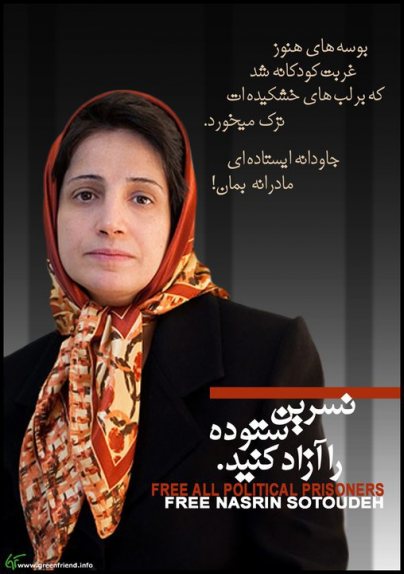Iran Feature: The Week in Civil Society --- From Economic Crisis to Nasrin Sotoudeh's Hunger Strike (Arseh Sevom)
 Detained lawyer Nasrin SotoudehThe latest weekly review of developments inside Iran from Arseh Sevom, the NGO promoting human rights and civil society:
Detained lawyer Nasrin SotoudehThe latest weekly review of developments inside Iran from Arseh Sevom, the NGO promoting human rights and civil society:
Economic instability continues to rock Iran while executions for drug offenses continue despite international protest. The work of children's activists is recognized internationally, and gender segregation becomes more widespread. Sanctions against the banking center have left many in Iran without access to needed medication. Imprisoned lawyer Nasrin Sotoudeh begins a hunger strike.
Extreme Couponing Comes to Iran?
Despite officials’ constant efforts to mitigate the effects of sanctions, Iran is wracked by economic instability and hardship. Donyay-e-eqtesad reports MP Ahmad Tavakoli’s proposal to revive the coupon system and rationing as a way out of the economic crisis. The increase in prices coupled with limited purchasing power has made day-to-day life significantly more difficult for ordinary citizens in Iran. According to Iranian Labor News Agency [ILNA] [fa], the Central Bank reported that as of September, Iran’s annual inflation rate stands at 24%. Experts expect a drastic increase in the rate for the second half of the Iranian year, which begins in March. In another report, the absolute poverty rate has been calculated at between 25% to 32%. An additional 2% of the population has dropped into poverty each year over the past three years.
Deutsche Welle writes that 5% of Iranians are known to suffer from hunger and 7.5% of them cannot afford medical treatments. Iranian Students’ News Agency [ISNA] reports a quadrupling of the costs of medical treatments offered by public health centres.
Sanctions, Special Diseases, and Required Medicine
In an interview with Tabnak, Fatemeh Hashemi, head of the Foundation for Special Diseases, said that about six million patients in Iran are affected by restrictions on imported medicines. She emphasised that the shortage is more for cancer and multiple sclerosis drugs, but thalassemia and dialysis patients are also dealing with difficult situations. The sanctions have seriously complicated banking transactions, causing a hike in prices and shortages in some sectors. This is true even though sanctions do not specifically target the sale of medicine and medical equipment to Iran, Hashemi added.
On 15 October, European Union ministers agreed to a new set of sanctions against Iran that ban natural gas imports from the Islamic Republic and framed it as part of a dual-track strategy for both negotiations and pressure.
Work with Children Receives International Attention
Five Iranian activists and Donya children’s research institute have been nominated for the 2013 Astrid Lindgren Memorial Award. According to Press TV, 207 candidates from 67 countries across the globe have been put forward for the 2013 award, including 61 first-time nominees.
Accident Takes the Lives of Students
In a deadly bus accident, 26 female students lost their lives and 19 were injured in southwestern Iran on Friday night. Los Angles Times reports that amid public outrage over the deaths, especially during a school trip, a Deputy Minister of Education tried to play down the event, "Accidents happen -- some people are hurt while climbing up escalators. Certainly nobody wished for this to happen."
The Arseh Sevom team offers its deepest condolences to the family of victims.
Shiraz University students protested against the implementation of gender segregation on the campus, as university officials created separate entrances for males and females at some buildings.
This is believed to be the beginning of a more comprehensive plan for complete gender segregation according to Bamdad Khabar. Kalame has also reported on the head of Azad University’s emphasis on the separation of men and women.
Imprisoned human rights attorney Nasrin Sotoudeh has begun a hunger strike to protest the pressures on her family during her six-year prison term.
Officials changed the visiting day from Sunday to Wednesday, making it difficult for Sotoudeh to see her husband and two young children.
"The conditions of detention imposed on Nasrin Sotoudeh are unacceptable and clearly aim at imposing additional punishment on her for her human rights activities," said Souhayr Belhassen, FIDH President.

Ten people convicted of drug offenses were executed on Monday despite calls from the international community to halt the death penalty in Iran.
Those executed today included Saeed Sedighi, whose family have actively challenged his sentencing. His brother was arrested earlier in the month for giving an interview about the case with BBC Persian. His mother protested outside Ayatollah Khamenei’s residence, drawing international attention. She wrote:
Since their father passed away, Saeed has been the family’s only hope. After 10 months of severe torture in prison, including two months in solitary confinement, my son is now awaiting his execution. I ask the world community to save my son’s life."

 Wednesday, October 24, 2012 at 11:20
Wednesday, October 24, 2012 at 11:20
Reader Comments